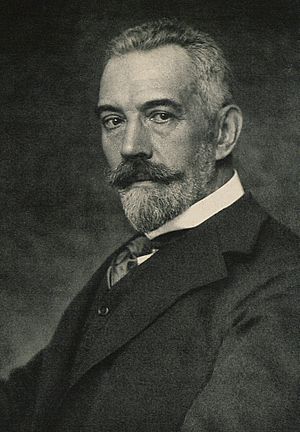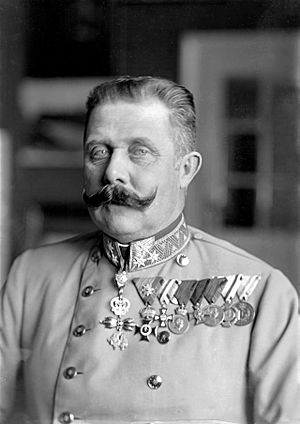Theobald von Bethmann Hollweg facts for kids
Quick facts for kids
Theobald von Bethmann Hollweg
|
|
|---|---|

Bethman Hollweg in 1914
|
|
| Chancellor of Germany (Imperial Germany) Minister President of Prussia |
|
| In office 14 July 1909 – 13 July 1917 |
|
| Monarch | Wilhelm II |
| Deputy | Clemens von Delbrück Karl Helfferich |
| Preceded by | Bernhard von Bülow |
| Succeeded by | Georg Michaelis |
| Vice-Chancellor of the German Empire State Secretary of the Interior |
|
| In office 24 June 1907 – 10 July 1909 |
|
| Chancellor | Bernhard von Bülow |
| Preceded by | Arthur von Posadowsky-Wehner |
| Succeeded by | Clemens von Delbrück |
| Personal details | |
| Born |
Theobald Theodor Friedrich Alfred von Bethmann Hollweg
29 November 1856 Hohenfinow, German Empire |
| Died | 1 January 1921 (aged 64) Hohenfinow, Weimar Republic |
| Political party | Independent |
| Signature | |
Theobald von Bethmann Hollweg (born November 29, 1856 – died January 1, 1921) was a German politician. He served as the Chancellor of the German Empire from 1909 to 1917. This was a very important time, especially as Germany entered World War I. He played a big part in the first three years of the war.
Bethmann Hollweg was replaced as chancellor in July 1917. This happened because military leaders did not agree with his more moderate ideas. He often tried to find a middle ground in politics.
Contents
Who Was Theobald von Bethmann Hollweg?
Theobald von Bethmann Hollweg was a key figure in German politics before and during World War I. He was known for trying to balance different political views. He believed in a strong monarchy but also supported some changes to make government fairer.
His Early Career Journey
Bethmann Hollweg quickly moved up in the Prussian government between 1884 and 1899.
- In 1899, he became the governor of Brandenburg.
- By 1905, he was the Prussian minister of the interior.
- In 1907, he became the Reich secretary of the interior.
He was briefly a member of the Reichstag (German parliament) in 1890. This experience made him dislike political parties. He remained an independent politician for the rest of his life. He tried to find a "diagonal course" between different political groups. He was against full democracy but also met with trade unions, which was unusual for a government official then.
Becoming Chancellor
Emperor Wilhelm II chose Bethmann Hollweg as Reich Chancellor in 1909. The Emperor liked his calm and compromising style. During his eight years as Chancellor, he supported some liberal changes. For example, he wanted to reform Prussia's voting system. However, he strongly believed that a monarchy with a parliament was the best way to govern Germany.
He upset conservatives when he gave Alsace–Lorraine its own constitution in 1911. Later, in 1913, liberal parties in the Reichstag criticized him. This was because he supported the military during the Zabern Affair, which caused trouble in Alsace–Lorraine. He felt he wasn't experienced in foreign affairs. So, he often let his foreign secretary handle things, especially during the Second Morocco Crisis. He tried to make a deal with Great Britain to stop the naval arms race, but he couldn't.
Germany and the Start of World War I
Bethmann Hollweg supported many of Germany's tough policies during World War I. He felt Germany was so threatened that it needed to do everything to survive. However, his support was often given reluctantly. He usually agreed only under pressure or when he saw that most people were against him.
The July Crisis and the "Blank Check"
After Archduke Franz Ferdinand was assassinated in June 1914, Bethmann Hollweg hoped the conflict would stay in the Balkans. But he promised Austria-Hungary Germany's full support. He backed Austria-Hungary's strong demands against Serbia.
Germany waited to mobilize its army until after Russia did. This was so Germany wouldn't look like the one starting the war. He supported the invasion of Belgium, seeing it as necessary for Germany's safety. But he also felt it was wrong and needed to be fixed later.
He also supported the "Septemberprogramm". This plan outlined Germany's war goals, including expanding its territory, mostly at Russia's expense. Later in the war, he changed his mind and opposed taking new lands.
Politics at Home During Wartime
At home, Bethmann Hollweg was the main person behind the Burgfriedenspolitik. This was a political truce in the Reichstag. Parties agreed not to criticize the government and to approve money for the war. He worked hard to get the Social Democrats to support the war effort. He believed this would unite the country.
On August 4, 1914, Emperor Wilhelm II famously said, "I no longer know any parties or denominations; today we are all German brothers and only German brothers." Bethmann Hollweg saw this as a great moment for Germany, hoping it would unite everyone.
Fighting for Peace and Reform
Bethmann Hollweg tried to stop unrestricted submarine warfare. But he eventually gave in to pressure from the military and conservatives. He approved its use, which meant German submarines would sink any ship, including passenger ships. This decision greatly angered the United States.
As the war went on, he proposed several peace plans. However, none of them were accepted by the Triple Entente (Britain, France, and Russia). In early 1917, he spoke about creating a more progressive "people's empire" with a constitutional monarchy. He also pushed for voting reform in Prussia again.
His ideas upset many conservatives. This gave military leaders like Quartermaster General Erich Ludendorff a chance to remove him. Many in parliament felt he had been in his job too long to negotiate a good peace. When Ludendorff and Chief of the General Staff Paul von Hindenburg threatened to resign, Bethmann Hollweg offered his own resignation to the Emperor. He left office on July 13, 1917.
Life After the Chancellorship
After resigning, Bethmann Hollweg went back to his home in Hohenfinow. He started writing his book, Reflections on the World War. He died on January 1, 1921, before he could finish the second part.
In his book, he talked about Germany's difficult position. He admitted that the government and the Emperor made mistakes leading to the war. He believed Germany shared some blame, but that it was a "common guilt" that led to such a huge disaster.
In 1919, he famously asked the Allied Powers to put him on trial instead of the Emperor. However, his request was ignored.
His Impact and Legacy
Bethmann Hollweg's actions had a lasting impact on German politics. His efforts to work with the Social Democrats helped them become a more accepted political force. This later influenced the creation of the Weimar Republic and the Federal Republic of Germany.
However, he was often criticized by his opponents. They called him a "defeatist" who wanted a "rotten peace." After 1945, some historians saw him as an "indecisive Hamlet" who doubted himself. Today, his grave in Hohenfinow is weathered and partially destroyed. He is the only German Chancellor of the Empire without a street named after him.
Images for kids
See also
 In Spanish: Theobald von Bethmann Hollweg para niños
In Spanish: Theobald von Bethmann Hollweg para niños
- Causes of World War I
- German entry into World War I
- History of Germany during World War I
 | Delilah Pierce |
 | Gordon Parks |
 | Augusta Savage |
 | Charles Ethan Porter |












